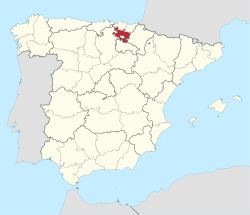| Cave of Zubialde | |
|---|---|
 | |
| Location | Zigoitia, Álava |
| Coordinates | 42°52′05″N 2°41′59″W / 42.86806°N 2.69972°W |
| Discovery | 1990 |
Cave of Zubialde is a prehistoric cave located in Zubialde, Gorbea, Spain.[1] In 1990 it was subjected to an authentication by the use of electron microscopy, chromatography and absolute dating, so it was defined as a black and red liquid painting.[1]
It was discovered in 1990 by Serafín Ruiz, a history student, and it was decorated by 20 animal figurines and 49 hand symbols.[2] It was the best prehistoric discovery of the decade and the most important of País Vasco.[3] It was dated in the Magdalenian, Upper Paleolithic (13.000 to 10.000 BC).[3]
In the same year, Peter Ucko, from the University of Southampton, and Jill Cook, from British Museum suspected they were fake,[4] and the Ertzaintza found out someone had painted the cave during 1990, and the main suspect was Serafín Ruiz.[5]
In 2008 another fraud was discovered in Iruña-Veleia similar to Zubialde.[6]
- ^ a b Alcina Franch, J.; Bendala Galán, M.; Elvira, M. A.; García-Ormaechea, C.; Jiménez, J.; Olmos, R.; Padró, J. (1997). "El arte de la Antigüedad en la hora actual". In Barandiarán, Ignacio (ed.). Historia del arte: El mundo antiguo. Vol. 1. Alianza Editorial. ISBN 9788420694818.
- ^ "Zubialde, la falsa Altamira del País Vasco". ABC (in Spanish). December 30, 2015. Retrieved April 12, 2018.
- ^ a b Gónfora, F. (2006). "El estigma de Zubialde". El Correo (in Spanish). Retrieved April 12, 2018.
- ^ Ucko, Peter; Cook, Jill (2014-01-07). "None". The European.
- ^ Gorospe, Pedro (August 14, 1992). "La Ertzaintza descubrió que alguien pintó en la cueva de Zubialde durante 1990". El País (in Spanish). Vitoria. Retrieved April 12, 2018.
- ^ Azumendi, Eduardo (November 21, 2008). "El caso resucita el episodio de la cueva de Zubialde". El País (in Spanish). Vitoria. Retrieved April 12, 2018.